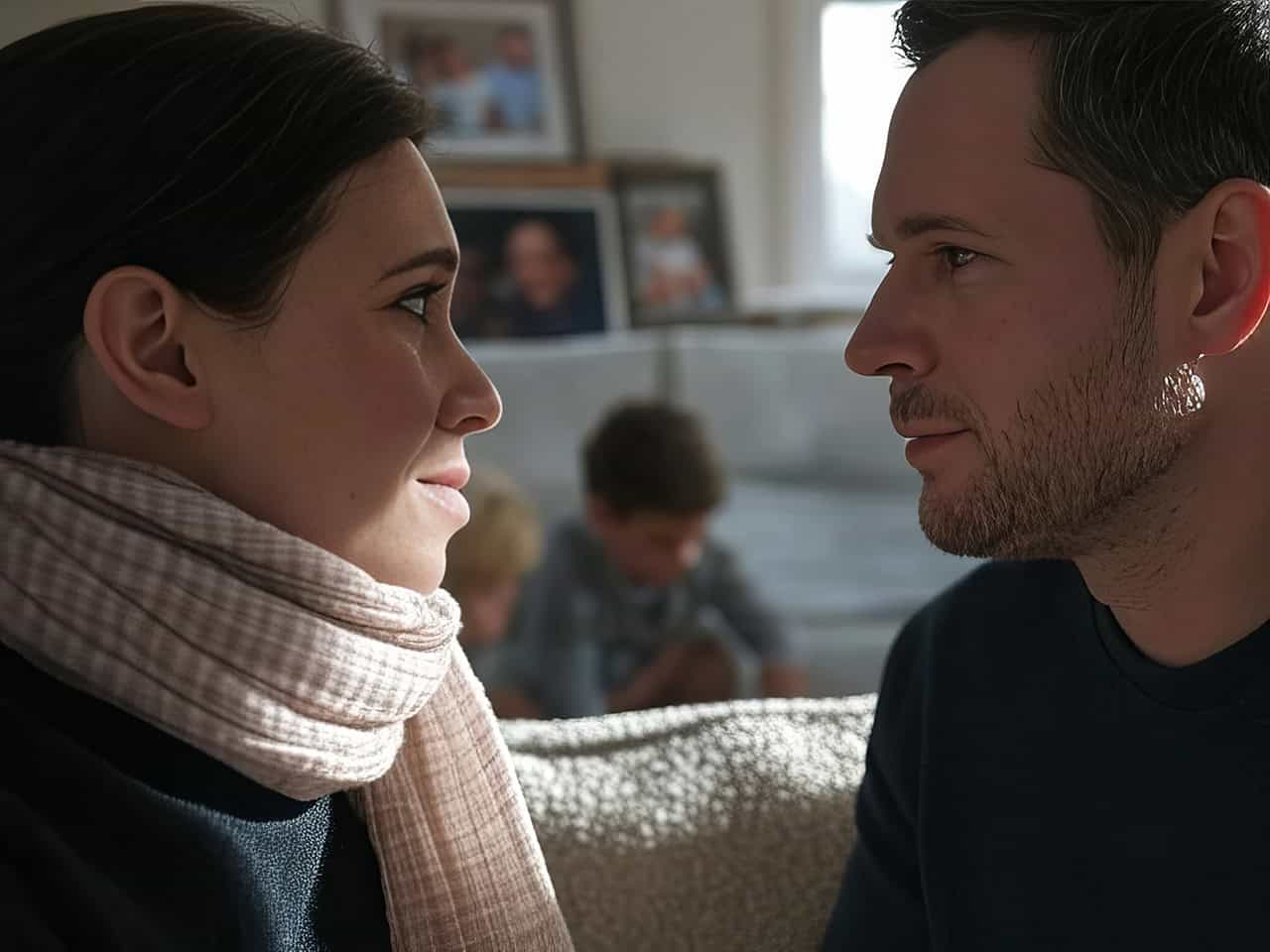Let’s talk about something that’s tough but important: how to be there for your wife during breast cancer treatment. We recently sat down with Dr. Heather Richardson of the Bedford Breast Center for a candid conversation about what husbands can really do to help.
The statistics aren’t pretty – women are six times more likely to face separation or divorce after a cancer diagnosis than men in the same situation. But with the right knowledge and approach, you can be the support your wife needs during this challenging time.
Interview with Dr. Heather Richardson
(Note: This interview has been lightly edited for clarity, while maintaining all essential information and advice.)
As a husband, what are the most important ways I can support my wife immediately after her breast cancer diagnosis?
Dr. Richardson: The statistics are sobering: men are six times more likely to separate from or divorce their wife after a cancer diagnosis than women would be to leave their male partners in the same situation. Specifically, the separation and divorce rate for male patients with a cancer diagnosis is 2.9%, while for female patients it’s 20.8%.
The most important thing anyone can do for a partner is to be there and specifically let them know you aren’t going anywhere. Understand that you’ll need to pitch in to do things they may not be able to do because they’re physically or emotionally exhausted. This might mean taking them to appointments, handling chores and errands, or delegating these tasks to family members. Sometimes, it’s as simple as lending an ear and letting them voice their fears and concerns.
The “Ring Theory” of support is particularly valuable here. This concept positions the person undergoing treatment at the center, with support flowing inward toward them, while complaints, criticisms, and concerns flow outward to other supportive and more distant family members. For example, if your wife shares concerns about losing her hair or not being around for your children, you provide support and reassurance. You then share your own fears about possibly losing your wife with family members and coworkers, but not with your wife herself.
How can I help my wife make informed decisions about her treatment options?
Dr. Richardson: Taking interest in test results and recommendations is the best place to start. While the Internet can provide information, it’s easy to get lost in rabbit holes of alternative treatments and toxic responses to personal journeys. Be an advocate for your partner by ensuring all avenues have been explored. Ask questions like “Why do you feel this is the best treatment plan?” It’s also good to inquire about treatments that aren’t being offered and understand why they’re not recommended in your wife’s case.
Most breast cancer treatment protocols involve surgery, usually some form of medical treatment, and sometimes radiation. Make sure to ask about follow-up protocols after treatment, and identify the point person for questions and times of need.
What lifestyle changes should we expect during and after treatment?
Dr. Richardson: Let’s address one of the hardest aspects head-on: sex life. Women with breast cancer face a double blow – changes to their femininity and feeling their life is at risk. Add to this the significant impact on hormones, and most women experience changes in desire and libido.
Showing affection and interest when your wife’s appearance changes is crucial for maintaining intimacy. She’ll likely feel more vulnerable, so increased attention may be needed. The standard of care for most women facing breast cancer includes medicines that reduce feminine hormones (estrogen and progesterone). There are ways to help with this transition, including new medicines for hot flashes, anxiety, and sleep issues.
Exercise is one of the best ways to mitigate hormonal changes, reduce future breast cancer risk, and improve overall health. Encouraging positive, healthy habits can help strengthen your relationship during these tough times. The key is pulling together instead of feeling resentful and pushing apart.
Regarding hormone therapy, some studies suggest that low-dose hormonal supplementation along with anti-estrogen medicines can reduce breast cancer risk and improve survival. Dr. Rebekah Glaser’s research is worth exploring, though this should be discussed with your medical team. While using hormones after breast cancer diagnosis is controversial, many women have done well either staying on hormones or declining standard anti-estrogen medicines.
For most women, the absolute benefit of taking anti-hormone medicines is 4%. While this might seem small, when applied to the over 200,000 annual breast cancer diagnoses, it could affect 8,000 women’s lives. Unfortunately, we don’t yet have tests or protocols to identify who falls into which category, so the standard care for most women with estrogen-positive invasive breast cancer is to avoid hormones and take hormone blockers.
How should we approach intimacy and physical relationship changes during and after treatment?
Dr. Richardson: Changes in vaginal wall thickness and lubrication are usually straightforward issues with available solutions. Different lubricants and vaginal estrogens are generally accepted treatments. As mentioned earlier, sexual health, ability to achieve orgasm, and overall desire will be greatly influenced by the absence of hormones or the use of hormone blockers.
From your experience, what are the biggest challenges couples face during breast cancer treatment?
Dr. Richardson: For the most part, the person with the cancer diagnosis may be somewhat checked out mentally and emotionally. Whatever their usual duties in the relationship are, the other partner will have to take them on – whether that’s emotional support or family care. This extends to practical matters and often includes concerns over finances, depending on both partners’ career situations.
Are there any promising new treatments or drugs that give you hope for better outcomes?
Dr. Richardson: There are exciting new nonsurgical treatments emerging. Women should know they don’t have to sacrifice cosmetics and appearance to be cured of cancer. We now have nipple-sparing, skin-sparing, and even sensation-sparing surgeries with nerve grafts to help preserve as much as possible.
New surgical implants that utilize more native tissue are being developed, allowing patients’ healthy tissue to grow into them for more natural reconstruction. Pharmacologically, targeted immunologic treatments with fewer side effects are becoming more prevalent. We’re hoping for customizable immunization against cancer cells in the future, which could mean universal cure regardless of stage or type of cancer.
While we’re not there yet, medical science is focusing on better testing to determine which patients would benefit from specific treatments. This helps avoid unnecessary, expensive, time-consuming, painful, or toxic treatments for patients who won’t benefit from them.
We’ve heard about rising breast cancer rates since 2020. What factors do you think are contributing to this increase?
Dr. Richardson: The main factors are obesity, exposure to hormones and hormone-like chemicals in the environment, but probably most importantly, women are having fewer children and having them later in life.
How do you advise couples to maintain their emotional connection and communication throughout this journey?
Dr. Richardson: Share your thoughts and feelings (using the ring method helps). Create a unified front where you’re approaching this together. There’s often a tendency for the healthy partner to feel their needs aren’t being met, or they’re not getting enough attention when their partner is receiving so much focus from friends, family, and medical visits. This can lead to pulling away or seeking attention outside the marriage, which can severely damage your relationship.
Focus on healthy activities you can do together, taking into account the cancer patient’s stamina. Plan things for the future when the person will feel better. Try to maintain normalcy through activities you typically enjoy, like cooking together. This helps mentally propel you through the treatment.
What resources or support groups do you recommend for husbands/partners of breast cancer patients?
Dr. Richardson: The Cancer Support Community (cancersupportcommunity.org) offers free support groups and activities in many U.S. and Canadian cities. These are available to cancer survivors, patients, and their caregivers/families. Local support groups are also valuable, especially for younger patients who need to connect with others their age who are coping and surviving. There are sexual health and support classes available, and it’s important to have frank conversations with your care team about needs and sexuality, as this is recognized as an important aspect of survivorship.
When can we expect to return to ‘normal life’ after primary treatment ends?
Dr. Richardson: While this is situation-specific, a good rule of thumb is to expect recovery to take as long as the treatment itself. For example, if someone is diagnosed on January 1, starts chemotherapy in mid-February, finishes in early August, has surgery in late August, and completes radiation by mid-November, they might feel normal about a year later. However, someone with a simple lumpectomy for DCIS stage zero cancer who has surgery in January and needs no further treatment might feel better in one to two months.
Supporting Your Wife Through Recovery
Dr. Richardson’s insights offer a valuable roadmap for husbands navigating their wives’ breast cancer journeys. Her candid approach to discussing both the medical and emotional aspects of treatment – from hormone therapy to intimate relationships – provides the kind of practical guidance that’s often hard to find.
I’d like to thank Dr. Richardson for sharing her extensive experience and offering such comprehensive advice. Her work at the Bedford Breast Center continues to support countless couples facing breast cancer diagnoses, and her willingness to address even the most challenging aspects of this journey helps create better outcomes for both patients and their partners.
Remember: while this guide provides a framework for support, every cancer journey is unique. Stay connected with your medical team, keep communication open with your wife, and don’t hesitate to seek additional support when needed.
For more information about the Bedford Breast Center and Dr. Richardson’s work, visit bedfordbreastcenter.com



And above all, when the harsh therapies end and the lifelong hormone blockers start, be prepared for a mean woman who has no interest in anything you want to do, now considering your every thought and action to be stupid, unwanted, annoying, and useless…and if you have young children this will extend to them too, but everything they do to make her angry is your fault. The more loving and sincere you are, the more cutting and painful the responses will be. You knew you were marrying her in sickness and in health, but you probably had no idea you were going to be the reason for everything wrong in the universe, unworthy of the kindness or respect a maid, nanny, or butler might expect from their employer. Above all, never voice your needs, desires, or concerns, as you will be sliced up in the most painful ways you have yet to imagine.